August 16, 1985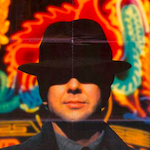
This may be surprising, but YEAR OF THE DRAGON is one of the Summer of 1985 movies that I hadn’t seen before. So today I have officially entered the post-having-seen-YEAR-OF-THE-DRAGON section of my life. For those of you who are still in the first section, let me explain: this is the Triads-in-New-York’s-Chinatown movie directed by Michael Cimino as his followup to the financial disaster of HEAVEN’S GATE, and he wrote it with Oliver Stone. So it’s quite a movie. 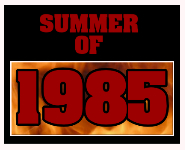 Aggressively stylish, go-for-broke filmmaking, astonishing production design and camerawork, epic in scope and detail, clearly heavily researched, also completely macho and full of shit, easy to see as racist and misogynistic, or at least very sympathetic toward a protagonist who is, and who by the way is played by weird, handsome, hungry Mickey Rourke, with all that that entails. So it’s hard to quantify YEAR OF THE DRAGON in the standard “good” or “bad” type terms most people insist on. I’m pretty sure I would run from it if I saw it on the street, but also I think it’s pulsing with entertaining pulp and cinematic greatness.
Aggressively stylish, go-for-broke filmmaking, astonishing production design and camerawork, epic in scope and detail, clearly heavily researched, also completely macho and full of shit, easy to see as racist and misogynistic, or at least very sympathetic toward a protagonist who is, and who by the way is played by weird, handsome, hungry Mickey Rourke, with all that that entails. So it’s hard to quantify YEAR OF THE DRAGON in the standard “good” or “bad” type terms most people insist on. I’m pretty sure I would run from it if I saw it on the street, but also I think it’s pulsing with entertaining pulp and cinematic greatness.
New York commercial director turned L.A. screenwriter Cimino wrote MAGNUM FORCE with John Milius, which led to starting his directing career with his spec screenplay THUNDERBOLT AND LIGHTFOOT, a favorite of mine. Then he quickly rose and fell with that pair of movies he’s mainly known for, THE DEER HUNTER and HEAVEN’S GATE. Five years of struggles later here he was up on his feet again, co-writing a crime movie with his fellow genius/maniac of coke-fueled cinema Stone, who took the job in trade for Dino De Laurentiis funding PLATOON (which the producer later bailed on). So Stone was a year away from respectable dramas, coming off of writing CONAN THE BARBARIAN and SCARFACE. That’s some fuckin momentum. He was ready to go off a jump.
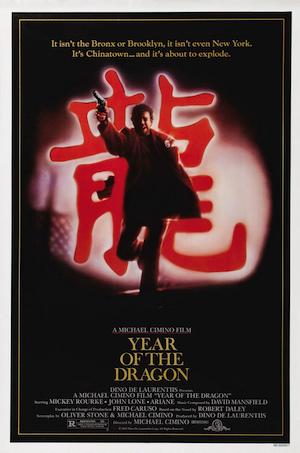 Rourke plays Stanley White, a decorated but widely hated NYPD Captain who has just been put in charge of the Chinatown beat. He sees it as a neighborhood plagued by corruption and organized crime, as evidenced by the public assassination of a Triad leader. In fact, during that guy’s funeral parade, thugs kill a store owner who won’t give them protection money, while Stanley is right up the block telling the previous guy he’s taking over.
Rourke plays Stanley White, a decorated but widely hated NYPD Captain who has just been put in charge of the Chinatown beat. He sees it as a neighborhood plagued by corruption and organized crime, as evidenced by the public assassination of a Triad leader. In fact, during that guy’s funeral parade, thugs kill a store owner who won’t give them protection money, while Stanley is right up the block telling the previous guy he’s taking over.
Stanley is a Vietnam vet, he’s terrible at being in a marriage, he has a compulsion to joke about spare ribs in Chinese restaurants, and they didn’t think he would actually for real go after the gangs. It rattles absolutely everybody when he goes to the Triad elders, does not accept their ass kissing and makes threats.
“I told you to kick ass on the young gangs, not the old guys,” his boss Lou (Raymond J. Barry, CHRISTMAS EVIL) says, so Stanley lectures him about “the Mafia concept’s not even Italian, it’s Chinese!” He thinks the department treats Italian and Chinese organized crime differently, but he’s also one of these guys we know from cop movies and New York movies and ‘70s movies who’s annoyingly preoccupied with ethnicity, looking for opportunities to bring up “the Puerto Ricans and the Pollacks” or whatever.
He notices a local reporter, Tracy Tzu (fashion model Ariane, who’s actually of Japanese and Dutch heritage, but born in New York) and tries to convince her to do stories exposing the Chinatown “businessmen” he’s after, because “If it’s some white broad they say it’s racist, if it’s you they figure it has to be on the up and up.” She immediately recognizes him as “a crackpot racist,” but he gets her to have dinner with him at the huge gang-owned restaurant that’s a central location in the movie, and shows off that he’s been reading a book about China. She recites Cimino & Stone’s character bio about her parents’ backgrounds, he blows out all of their research hot air about Chinese immigrants building the railroads and shit. (At least some of this heavy-handed exposition is trying to address a history of discrimination.)
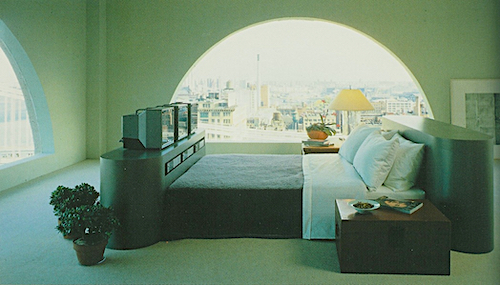
He comes to her loft apartment, an incredible place with elevator access, three TVs lined up, a nice record shelf, a piano, and an open shower room next to one of several 15’ wide arch windows with a view of three bridges, the World Trade Center, the Statue of Liberty and the Empire State Building. He thinks he’s there to have sex, but she tells him to leave so he does one of those rapes where she says no and slaps him twice and he tears off her shirt and then she’s into it so we are to believe she actually consented all along and he knew it through Spidey Sense or some shit. Later there’s a non-violent sex scene where she awkwardly declares that she loves him.
As I mentioned, he’s married, and his poor wife Connie (Caroline Kava, whose only previous movie role was as a prostitute in HEAVEN’S GATE) is one of the best parts of the movie. When we first meet her, before we know how shitty he treats her, she’s on the floor, smoking, in the middle of repairing both the sink and the washing machine, and she tells Stanley not to bust her balls. I like her. Then we find out that she’s a nurse, and has to go do a late shift now. And that she’s pissed because he forgot to show up on Wednesday when they were supposed to have sex while she was ovulating. As if they even needed a serious issue like not being on the same page about having kids.
To me Kava is magnetic in the scene where she’s waiting for him at the front of the crowded restaurant. He shows up late and she’s pissed (I’m sorry to say I’ve been that guy) and also she sees him through the window talking to Tracy (okay, I never did that though), and she doesn’t have a chance to talk to him about this before he introduces her to the owner/gang boss like a big shot and then sits her down and walks into the back with him to do more police talk. That whole scene in the back room I never forgot or forgave that she was waiting for him.
Or not. She leaves. Good for her.
I mean I like Tracy and I understand she’s the exciting one, but Connie is so sympathetic, and it cuts immediately from her kicking him out of the house to him driving along waving flowers out the window at Tracy. Wastes no time at all. Connie even cried to him about everything she did to get to have kids with him and now he’s gonna go do it with someone ten years younger. She fuckin called it!
Not that he’s great to Tracy either. Even disregarding the earlier quasi-rape scene, when she tells him she’s been raped by thugs (thankfully off screen) his reaction is to throw her into a chair and shake her, yelling “WHO RAPED YOU?”
(I want to be clear that the movie knows he sucks here. Tracy immediately tells him off for acting like that. “It didn’t happen to you. It happened to me.”)
I’ve read variously that the part of Stanley was intended for Nick Nolte, Jeff Bridges, Clint Eastwood or Paul Newman. Rourke is very different from any of those guys. I’m too young to remember him as the rising it-guy – a half a year after this 9 1/2 WEEKS came out, and it seems to me like that movie largely defined him for years. But consider that when he signed on for this he was in his early thirties, about five years into his movie career, and he’d already been directed by Steven Spielberg, Lawrence Kasdan, Barry Levinson, Francis Ford Coppola and Nicolas Roeg, in addition to Cimino. No wonder he was cocky enough for this role.
I can only speculate which actorly details are things Rourke came up with, but it’s full of the little touches of personality that can separate one Over the Edge Cop character from another. Like, when we first meet him he has a scab on the bridge of his nose. No explanation needed. Of course this guy got punched recently. He also has grey streaks in his puffy hair, intended to make him seem older, but I don’t know – maybe he’s had a ghost encounter. And there’s a big scene where an informant brings him down into a huge underground soybean factory (it’s dark down there and the cops keep rudely pointing flashlights in the poor worker’s eyes) to show him some dead bodies floating in a vat. He does not hesitate to climb right into the water to examine the corpses. In a later scene he’s talking to Tracy as she showers and just to get a rise out of her he casually steps into the bath water, no concern for his shoes, socks and pants.
Were both of those scripted? Maybe only the first one, and then Rourke knew he could handle it so he threw in the second one for laughs? I have no idea, but both of them make this character more interesting. Who does that?
(A New York Times article about creating the apartment for the movie mentions that the tub wasn’t intended to be filled, and the crew woke the designers up during a night of filming asking how to plug it. Hmmm…)
Speaking of shoes, I love the moment where he mourns Connie by sitting in the house holding her shoe. Now days they wear athletic footwear, but my mom was a nurse at that time so I remember those white shoes with the big ass soles for standing up all day.
The filmatism of the movie is like Rourke’s performance – huge, but with all kinds of tiny touches that ground it. Cimino, cinematographer Alex Thomson (RAW MEAT, THE KEEP) and production designer Wolf Kroeger (POPEYE, FIRST BLOOD) create this enormous world of Chinatown – the gigantic, crowded restaurant, the dance club that seems to hold thousands, the streets teeming with crowds and neon signs. So many long tracking shots through these places, into the kitchens, the offices, the back rooms, the tunnels.
(I was shocked to learn that it was filmed mostly on soundstages in North Carolina! De Laurentiis Entertainment Group built their studios to accommodate the Chinatown sets, and chose Wilmington after filming FIRESTARTER there. Tracy’s apartment really was in Brooklyn, though, on the top floor of a factory building converted by a Manhattan interior design company called Lembo-Bohn Design Associates, who had worked on Cimino’s actual apartment. That’s why the view from the windows doesn’t look like a green screen or a model – it’s real!)
It’s a world filled with so many little characters, like the minor background officers we see pissed at Stanley, or feeling sorry for him, or ready to grab him and hold him back. Or the two feisty nuns who they have listening to a bug and taking notes, who Stanley is rude to. (That must be a thing for some reason, recruiting nuns for that job, but I never heard of it and I loved it.) Or there are these young women with red and blue punk hairstyles who we see hanging out more than once and then late in the movie they become very important for a minute or two of mayhem. We never really knew anything about them and they’re among literally hundreds of people but they function like some minor character in a MAD MAX movie.
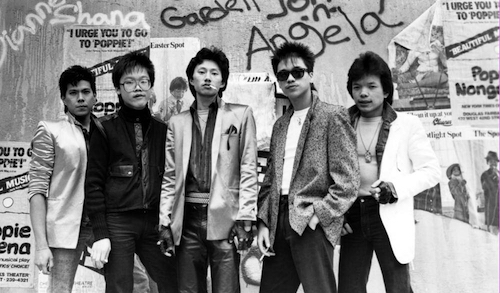
Within that world, shit is always liable to pop off. Stanley punches Lou in his own office, launching him against a table, knocking a stack of books onto the ground, then tells an intervening officer that it’s “between two guys in the old neighborhood.” Every part of that seems like something Cimino would make up or Stone would make up or Rourke would improvise or would happen by accident. Perfect sweaty macho synergy.
I haven’t even gotten into that this is a Triad movie. It starts with a disclaimer that it’s not meant to demean Chinese-Americans, added after some Chinese-Americans felt demeaned by it. I think it can be defended on the grounds that it’s very much along the lines of great Hong Kong gang films, and also that it’s giving the Chinese mafia a sweeping cinematic treatment like THE GODFATHER gave the Italian mafia. But of course the difference is that most of the great mob movies were made by Italian-American directors, inspired by their own communities and families (and still being criticized by some of them for it), while this is a white director and writing team, adapting a book by NYPD deputy commissioner turned novelist Robert Daley, depicting another culture, another race. Suitably they frame it from the perspective of a white guy, but therefore it’s depicting Asian-Americans as the other. Stanley is an intruder in a strange land, and we are too.
But when it drifts away from Stanley it feels like a legit Hong Kong crime epic. John Lone (ICEMAN) is great as Joey Tai, Deacon Frost type who we don’t have to be told is behind a hostile takeover of the organization, arranging the death of his own relative so he can blame “Uncle” Harry Yung (Victor Wong right before BIG TROUBLE IN LITTLE CHINA)’s leadership and take over. During the tangent where he meets with their Toronto rival “White Powder” Ma (Mei Sheng Fan, THE ONE-ARMED SWORDSMAN, INTIMATE CONFESSIONS OF A CHINESE COURTESAN, THE POSTMAN STRIKES BACK) and then goes to Thailand to confront a warlord (Yukio Yamamoto, FORTY DEUCE) about heroin shipments I thought of movies like BULLET IN THE HEAD and TOO MANY WAYS TO BE NO. 1. But Cimino has the means to give it that extra enormity. Joey shows up at this jungle base and goes past rows and rows of people wearing traditional costumes. And the meeting isn’t just two guys talking – it’s two guys talking at a long table with soldiers between them, eating and drinking and not realizing how serious shit is about to get. And you realize man, most movies would think it was too complicated just to take him out of the country.
So much happens in under 2 hours and 15 minutes. It doesn’t seem like much time is spent on Stanley’s nerdy undercover agent Herbert Kwong (first movie for Dennis Dun, also right before BIG TROUBLE IN LITTLE CHINA), yet the moment where Herbert’s job in the kitchen hits pay dirt sure got my heart beating fast. And the the finale is great – a weird mix of intimate (in a western showdown sort of way), atmospheric and unhinged.
I wouldn’t consider it an action movie exactly – the violence isn’t so much thrilling as messy and scary and consequential, more like SCARFACE. IMDb lists Mike Adams, Billy Burton (A BOY AND HIS DOG) and Buddy Van Horn (Clint Eastwood’s guy) all as stunt coordinators. Chuck Zito was one of Rourke’s doubles after Cimino hired Hell’s Angels to make sure he kept up his fitness training.
As far as where this stands in regards to our current understanding of police porn/copaganda – on one hand, it shows the NYPD as corrupt and inept shitheads, who refuse to do anything about this problem, and the only guy who will is a cheating loser racist who everybody hates being around. In the end he only kind of wins, all the nicest characters have died horribly, and the cycle seems destined to continue with a new crime boss. On the other hand, that’s what many of these movies are like; it definitely portrays something romantic about Stanley’s thorough shittiness, and some sort of ends-justifies-the-means heroism in his actions. And that’s the exact horse shit that seems real to the percentage of this country who bend over backwards to justify absolutely any police abuse or systematic justice that ever happens. When Stanley lines up the troops for a raid and yells “Fuck their civil rights!” are we supposed to agree? Or are we supposed to forgive it because he also threatens to punch any officer who takes a bribe? And does it even matter?
So your mileage may vary on that score. It’s complicated. As is the movie itself. Dumb and brilliant and complicated. It’s hard to like, but easy to kind of love.
Many reviews, therefore, were mixed. Dave Kehr of The Chicago Reader summed it up well, writing, “Cimino’s talent is at least 50 percent hot air, but the part that is not—his superb feel for movement across the Panavision frame—seems especially valuable. Say what you will about his overstuffed, overdetailed images, they at least represent a notion of cinema, as opposed to the flat television aesthetic that dominates Hollywood, that no film lover can afford to ignore.”
Like THE BRIDE, plenty of criticism was thrown at the female lead, once again dismissed as some talentless blank hired only for her looks. Ariane does struggle with some stiff dialogue (especially the news broadcasts not written in the style of actual news broadcasts, a pet peeve of mine), but I think she brings a strong presence – a strength and an American-ness that offsets at least some of the movie’s inevitable exotification of her character. And with her short hair, unusual apartment and cynical responses to Stanley, she’s just cool. I think that’s worth something.
YEAR OF THE DRAGON was nominated for a best foreign film César, two Golden Globes (John Lone and composer David Mansfield), and five Razzies. It opened modestly, in fifth place below BACK TO THE FUTURE, VOLUNTEERS, PEE-WEE’S BIG ADVENTURE and RETURN OF THE LIVING DEAD, with a higher per-screen average than two of those. But it didn’t make back its budget.
That’s okay. Something would feel wrong about making a movie like this without wasting somebody’s money.
NOTES:
Summer of 1985 connections:
Like RAMBO: FIRST BLOOD PART II, it tries to deal with the after effects of the trauma of American soldiers losing a war, with the idea that he can find some solace in a symbolic continuation of the war (this time conflating Chinese-Americans with Vietnamese guerrillas). There’s even a part where Stanley complains to his superiors, “This is Vietnam all over again. Nobody wants to win this thing, do they?” Incidentally they also use the theme of ‘Nam vets and Korea vets not understanding each other, as seen in David Morrell’s First Blood novel.
Less substantive, but still something I insist on mentioning: there’s a fight in a dance club restroom that rams open occupied stalls, similar to the part in RAPPIN’ where Mario Van Peebles kicks open a stall in anger, not knowing a guy is taking a shit in there.
Legacy:
Ariane’s terrible reviews pretty much sunk any chance of turning this major role into much of an acting career. She only has four other IMDb credits, including a cameo in KING OF NEW YORK (1990) and co-starring with Kirk Baltz in SKIN ART (1993). But she continued to be a successful model on the runway, on magazine covers and in commercials.
Mickey Rourke later co-starred in DOUBLE TEAM.
Michael Cimino only made three more features – THE SICILIAN (1987), DESPERATE HOURS (1990), and THE SUNCHASER (1996) – none of which he wrote. For years he tried to get funding for a 3-hour movie about the Chinese Revolution that he said was his best screenplay, but he failed to get it off the ground before his death in 2016. Now when you search his name on IMDb he comes up after the kid with the same name from the TV series Love, Victor. Oh well.
* * *


























August 19th, 2020 at 4:21 pm
Excellent review. It’s sometimes great and sometimes a complete mess. I’ve read that the restaurant shootout was an influence on the teahouse shootout in Hard Boiled, but I can’t recall if that came from John Woo himself.
From what I remember, there’s a scene where Rourke is berated by a friend for getting drunk after his wife’s funeral, which I found insane. Equally insane, but in a good way, is the part where the punk chick is bouncing between speeding cars. I’m not even sure how they did that one.